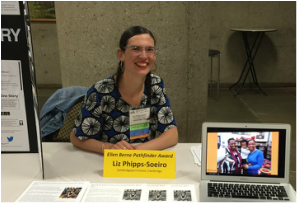and a 2016 winner of the Ellen Berne Pathfinder Award
| Over the last few weeks, librarians I admire greatly have posted their “confessions” that they are not giving every aspect of their jobs 100%. I welcome these admissions, especially as a working mother of two children and as a librarian with carts and carts of books to shelve and one thousand ideas for projects that will never come to fruition. We just can’t do it all, and that is okay! |
When we keep adding onto and piling initiatives and trends to our practice, both ourselves and our students are losing perspective of the power of the book, as object, story and vehicle of affirmation. We must embrace our strengths and professional knowledge. We have relationships with our readers that cannot be matched by a simple online search or a recommended amazon list. Librarians and their carefully curated libraries are needed now more than ever.
In a climate of high stakes testing which determine pace of curricula, curiosity and constructivism have a tendency to be smothered. Often times, children don’t have the time or the space in school to explore ideas or the ability to shape their educational trajectory. In many classrooms, reading is dictated by reading level not interest. Books are mainly used for didactic purposes to illustrate attributes of a storyline and teach skills; sight words, character traits, setting, etc. While these skills are imperative, we as librarians do not need to duplicate these efforts, save the close dissection of story for the classroom. This does not mean we should not discuss an author’s style, reflect on what we just read with our students or point out metaphor or style, but we should do so in a way without judging the academic competence of our patrons. We should factor in these considerations, but they should not completely drive our book choice for students.
Our duty as librarians is to provide literature free of judgement, and while we operate under the umbrella of “school”, this does not mean we should censor what we circulate under the guise of pedagogy. There is power in the ability of a second grader to check out and carry around a 600 page tome because books, even as objects, are powerful. On the other hand, as we see more five-year-olds coming into school as incredibly proficient readers, that does not mean they should skip over picture books and reach for middle grade books just because they “can”. I ask that we put away the “five finger rule” in the library and have an open mind.
Our students have little to no autonomy within our school walls, but that is different in the library. We should celebrate the library as a place for student independence, a place where children can make their own choices based on interest not just scholarship. Many readers that are labeled “reluctant” are often just “specific” readers who have not been offered choice in subject or content. It is our job to remember and to explain to teachers that reading a Minecraft manual is reading for information, that graphic novels (and comics!) do “count” as reading, and a lexile level should not prescribe what students should and should not read.
My library doesn’t have a 3D printer or a makerspace or a green screen, I just can’t do it. What I can do and what I throw my passion and energy behind is matching children with books, developing a collection that reflects, challenges and broadens my students’ worlds and create a welcoming and an inclusive space for my school community and beyond. This is at the heart of what we all do. You, fellow librarians, are a valuable resource in and of yourselves. Be kind to yourselves and do what you love for the sake of our students... and don’t beat yourself up about what you’re not doing.


